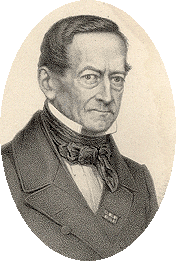<Back to Index>
- Philosopher and Statistician Gottfried Achenwall, 1719
- Writer Isabelle de Charrière (Belle van Zuylen), 1740
- Last Crown Prince of Korea Yi Un (Euimin), 1897
PAGE SPONSOR

Gottfried Achenwall (20 October 1719, Elbing – 1 May 1772, Göttingen) was a German philosopher, historian, economist, jurist and statistician. He is counted among the inventors of statistics.
He was born in Elbing (Elbląg) in the Polish province of Royal Prussia. Beginning in 1738 he studied in the Jena, Halle, again Jena and Leipzig. In the years 1743 to 1746, he worked as controller in Dresden. He was awarded his master's degree in 1746 by the philosophical faculty of Leipzig and went in the following to Marburg to work as assistant professor lecturing history, statistics, natural and international law. In 1748 he was called to the University of Göttingen to become extraordinary professor of philosophy, in 1753 extraordinary professor of law and regular professor of philosophy. In 1761 professor of natural law and politics, in 1762 doctor of both laws.
In 1765, Achenwall became court counsellor of the Royal British and the Electoral court of Hanover. With financial support from King George III he travelled to Switzerland and France in 1751 and to Holland and England in 1759.
In economics, he belonged to the school of “moderate mercantilists”; but it is in statistics that he holds a really high place. The work by which he is best known is his Staatsverfassung der Europäischen Reiche im Grundrisse (Constitution of the Present Leading European States, 1752). In this work, he gave a comprehensive view of the constitutions of the various countries, described the condition of their agriculture, manufactures and commerce, and frequently supplied statistics in relation to these subjects. German economists claimed for him the title of “Father of Statistics”; but English writers disputed this, asserting that it ignored the prior claims of William Petty and other earlier writers on the subject. Achenwall gave currency to the term Staatswissenschaft (politics), which he proposed should mean all the knowledge necessary to statecraft or statesmanship.